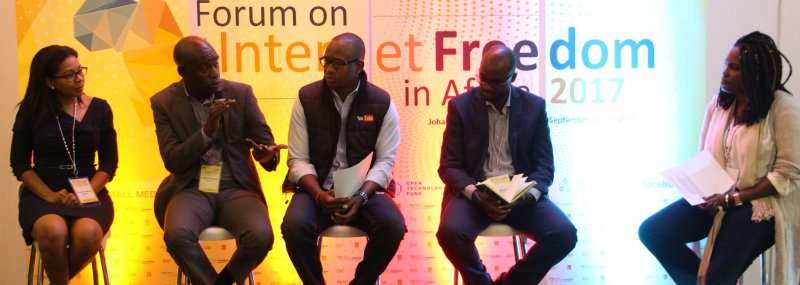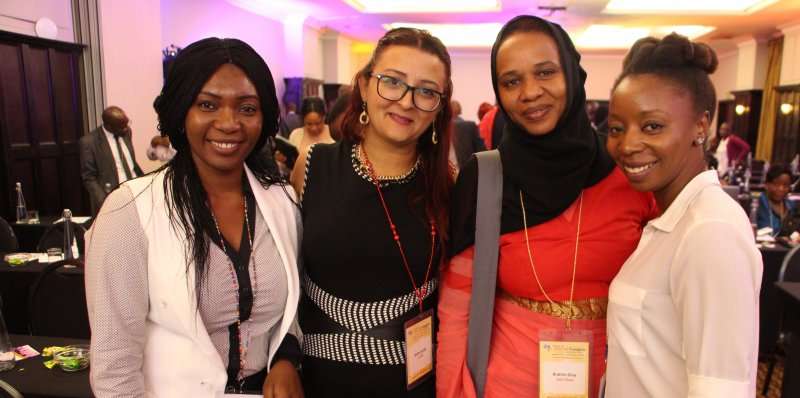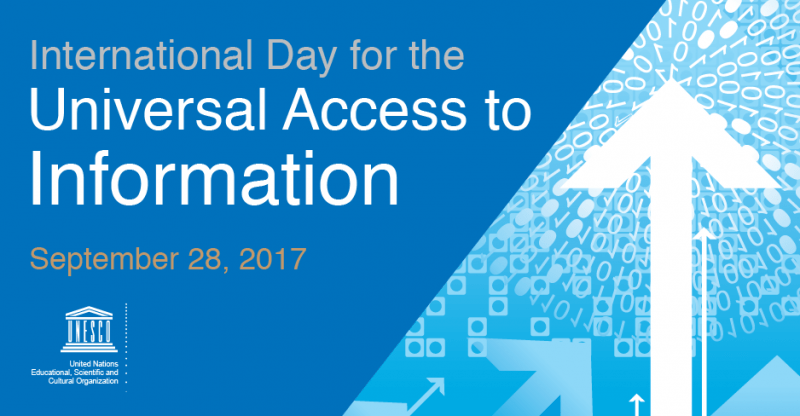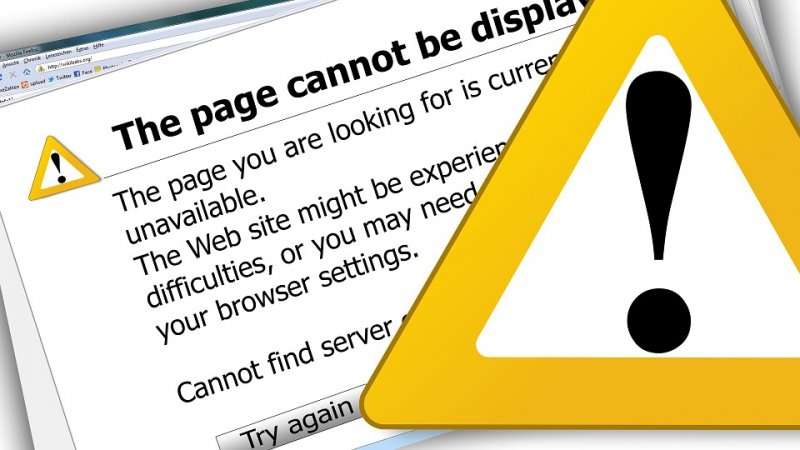Par Ababacar Diop |
Pour la première participation de Jonction au Forum sur la liberté de l’internet en Afrique (#FIFAfrica17) nous avons été ravi par la qualité de l’espace d’échange et de partage qui nous a été offert.
Organisé annuellement par the Collaboration on International ICT Policy for East and Soutier Arica (CIPESA) depuis 2014 à Kampala en Ouganda, et pour cette année 2017 en partenariat avec the Association for Progressive Communications (APC), à Johannesburg, le forum, s’est concentré sur plusieurs thématiques notamment la protection de la vie privée, l’accès à l’information, la libre expression, la non-discrimination et la libre circulation de l’information en ligne.
Des panélistes de haut niveau nous ont offert l’opportunité d’en apprendre davantage sur les enjeux et défis actuels de la société de l’information et de celui des droits numériques. Des interventions de qualités nous ont permis d’apprendre encore plus des expériences et des bonnes pratiques qui se développent en Afrique.
Nous témoignons, ce forum est un formidable espace de partage et d’échange d’expérience et de bonnes pratiques. Il permet en outre le renforcement des capacités des acteurs de la société de l’information et des défenseurs des droits numériques. La diversité linguistique en plus de la diversité géographique et de genre des participants constituent un vrai charme et une richesse intellectuelle du forum.
Nous avons appris à travers le forum que le réseautage est fondamental dans la défense des droits numériques. Les acteurs de la société de l’information ont besoin de collaborer et de travailler en synergie pour faire progresser les libertés sur internet, protéger davantage les données personnelles et le droit à la vie privée en ligne, faire face aux menaces qui pèsent sur la liberté d’expression sur internet partout en Afrique et lutter contre les coupures administratives d’internet pour des raisons politiques.
En effet, la présence de divers acteurs d’horizon divers a enrichi les panels et les discussions. Chacun exprimant ses préoccupations, ses expériences et ses objectifs pour une meilleure défense des droits et libertés sur internet. Tant les représentants de gouvernement que ceux de la société civile et du secteur privé chacun dans sa sphère d’activité s’est librement exprimé.
Nous avons également mesuré durant le forum toute l’importance de soutenir la recherche sur l’état de la liberté sur internet. En illustre le moment très fort lors du lancement du rapport annuel de recherche sur l’état de l’Internet en Afrique. Ce fut un intense moment de réflexion sur l’état de la liberté sur internet en Afrique. Ce rapport présentant l’état des lieux de la liberté sur internet en Afrique est si nécessaire pour les acteurs de la société civile africaine pour soutenir et documenter le plaidoyer et la sensibilisation.
Nous avons également appris que la réussite de tout forum repose sur le dynamisme et l’engagement des organisateurs. Nous félicitons ici les organisateurs et organisatrices qui n’ont ménagé aucun effort pour rendre agréable et studieux notre séjour. Toutes nos félicitations au comité d’organisation.
A la lumière de ce qui précède, nous lançons un appel à tous les bailleurs de renforcer leur soutien au Forum sur la liberté de l’internet en Afrique pour une plus grande participation des diverses régions de l’Afrique. La tenue annuelle du forum est d’une importance capitale pour les acteurs africain du Net. Un tel espace de rencontre, d’échange et de mise en réseau est nécessaire pour faire progresser le respect des droits numériques dans notre continent.
Nous lançons également un appel à tous les acteurs de travailler en synergie afin de mener la pression sur nos gouvernements pour le respect de la liberté d’expression sur internet et le respect du droit d’accès à l’information qui sont des piliers nécessaires à toute société démocratique qui aspire au développement économique, social et culturel. L’émergence de nos pays passe nécessairement par le respect des droits numériques.
L’Afrique a besoin de ce forum, l’Afrique doit soutenir le Forum sur la liberté de l’internet en Afrique.
Initialement publié sur le site de Jonction
“Fake News” and Internet Shutdowns in Africa – What is to be Done?
By Jimmy Kainja |
Malawian lecturer and blogger, Jimmy Kainja participated at the Forum on Internet Freedom in Africa 2017. He shares some insights on fake news and internet shutdowns post the Forum.
In 2016 after attending my first Re:publica, a techie conference in Berlin, I wrote of a need for Africa to have what I called a “collective thinking space” where like-minded actors on the African continent would converge to share ideas and inspire each other. The Forum on Internet Freedom in Africa, 2017 (FIFAfrica17) which was held in Johannesburg, South Africa which I recently attended was the type of gathering that I wrote about in 2016.
Organised by Corroboration on International ICT Policy for East and Southern Africa (CIPESA) and co-hosted by the Association for Progressive Communication(APC), the peak of FIFAfrica17 was the launch of two important reports by CIPESA: State of Internet Freedom in Africa 2017 and the Cost of Internet Shutdowns in Africa. The reports highlight how influential new technologies, specifically the Internet have become in African politics over the years. Speaking at the Forum, Google’s Fortune Mgwili-Sibanda, observed that not withstanding the low Internet penetration rate on the continent, the Internet today has become important to African politics in a similar way that broadcasting was in the age of coups in Africa.
State broadcasting stations were always among the first institutions to be ceased by successful coup leaders so they could announce their victories and spread propaganda. Today, noted Mgwili-Sibanda, authoritarian states are quick to shutdown the Internet to maintain power and control. The age of the Internet has arrived in Africa and it is only right that Africans engage with new technologies critically – FIFAfrica17 provided that space.
Apart from critical issues concerning security and gender equality online, cost of the Internet, freedom of expression, access to information and privacy online, there were two specific issues that stood-out for me: “fake news” and of Internet shutdown. “Fake news”, perhaps I happened to sit on its discussion panel and Internet shutdowns because for the first-time I got to meet people who have directly been affected by fake news and they spoke passionately about it.
Some thoughts on these two issues:
“Fake news”
We must first understand that the central problem with “fake news”, and this is why it matters, is the centrality of access to information in democratic societies. Information is a pre-requisite for citizen’s public participation, and meaningful public participation can only be realised when citizens have accurate and critical information. This can only be realised through free and independent media providing accurate and verified information, not “fake news”.
Of course “fake news” has always been around in various forms and guises – it is still the same today. There are “fake news” producers only using it as click-baits, the motive here is nothing more than monetising. Then there is “fake news” informed by cultural myths – in Africa, certainly in Malawi where I come from, you always have media reporting on cases such as witchcraft planes having landed somewhere, is this not “fake news”? Then the most critical one: deliberate “fake news” aimed at deceiving the audience, harming someone, maintaining or attaining power.
The first version of “fake news” is likely to drift away as society figures out this disruptive technology. The second version is harmless – societies are bound and they exist by cultural beliefs and myths. We must be worried with the third version of “fake news” as it is politically motivated and its consequences have a greater impact in society.
In some cases there is nothing that media institutions can do to stop the spread of “fake news”, and this is one of the reasons that the “fake news” phenomenon is technology specific – the Internet. Yet, this also emphasises the critical role that journalists have in ensuring that the public have access to accurate and credible information.
Verification and fact-checking in journalism have never been so important. It is also the only way that journalism is going to maintain its credibility intact. As the saying goes, it is better to be late and accurate than break inaccurate or incorrect news.
Internet Shutdowns
The cost of Internet shutdowns is colossal as indicated in the report launched at FIFAfrica17. Yet, for paranoid political leader trying to maintain control and power, there is no price that cannot be paid.
But then it is crucial to appreciate that Internet shutdowns involve two players – government and service providers. Governments are interested is shutting down the Internet to close off citizens expressing their dissatisfaction and misgivings about the government. While service providers have to abide by government orders or risk loosing operating licenses. Service providers are not charity organisations – their prime motive is to make profits.
This leaves civil society to battle for open and accessible Internet for all, against the collusion between governments and service providers. Gatherings such as FIFAfrica17, though seemingly techie niche, are thus very important for activists, civil society groups, academia etc. to bang heads, share experiences and chart the way forward.
If everything in the past has failed to bring about African consciousness and solidarity among the huge diversity of Africans then Internet is proving an exception. According to a 2015 Portland Communication study, “Africa Tweets” the political #hashtags in Africa show that there is more solidarity among Africans online – or at least on Twitter. South Africa’s #feesmustfall hashtag was more popular in Egypt than South Africa itself, for example.
This article was first published on Jimmy Kainja’s blog Spirit of Umunthu
Partager isoc chad sur le Forum sur la liberté de l'Internet en Afrique 2017 (FIFAfrica17)
Par Zina Brahim Mahamat |
Je suis très heureuse d’avoir participé au forum d’internet freedom au cours des 4 jours auxquels j’ai eu à capitaliser sur les différents tenants et aboutissants des droits Humains et leur mécanisme . Il est difficile de résumer une expérience aussi profonde et éclairante, mais l’aspects qualité des intervenants se sont distingués par leur riche expérience acquise.Tout d’abord, en tant que personne dont l’intérêt principal influe sur le plan d’activisme et la lutte pour rendre l’accés à la connexion internet, ce forum m’a permis d’avoir de nombreuses possibilités de poursuivre mes propres visions et m’a accompagné d’un echange merveilleux de collègues qui ont partagé avec moi des commentaires inestimables, un mentorat et une stimulation intellectuelle.
J’ai également apprécié de voir le modèle multipartite de la gouvernance de l’Internet en action et de pouvoir contribuer de manière active et constructive aux différents processus.le forum est spécial car il est tellement multidisciplinaire. Certains participants sont des économistes ou des avocats, d’autres ont des compétences en informatique ou en sécurité.
Certains sont de la société civile, certains sont du secteur privé, d’autres proviennent du gouvernement. Être entouré par des gens qui sont les meilleurs experts dans leur domaine et voir comment ils sont efficaces pour faire un changement, m’a inspiré à définir mes propres objectifs, à réaliser ma propre vision du changement et à planifier comment je peux avoir un impact dans mes recherches de luttes quotidiennes.Je considère en grande partie que le forum a été efficace car il a fallu un engagement continu de ma part et une grande volonté de transition linguistigue afin d’assimilier les grandes lignes et directives debattus durant les differents thematique .L’un des points forts du forum m’a permis d’approffondir mes competences en Mecanisme des droits humains et de piloter à bord mes aspirations et attentes en exigeant une planification à l’avance et que les projets contribuent de manière significative à l’avenir.
Il m’a offert l’opportunité d’interagir avec des membres de la communauté avec qui j’espère maintenir des amitiés à vie en construisant un reseaux et des liens d’espace d’echanges et partages des meilleurs pratiques adaptable en notre environnement de travail quotidien.Je continuerai mon combat pour les questions liées aux droits de l’homme, à la liberté d’expression, à la vie privée, à l’Internet ouvert etc.
 L’Association pour le Progrès des Communications (APC) et la Collaboration on International ICT Policy for East and Southern Africa (CIPESA) a co-organisé FIFAfrica17 du 26 au 30 Septembre à Johannesburg en Afrique du Sud, #ISOCChad à été honnoré par madame Zina Brahim Mahamat, Coordonnatrice chargé de la formation au sein de l’internet Society of Chad, qui a été sélectionné parmi les boursiers pour y assister.
L’Association pour le Progrès des Communications (APC) et la Collaboration on International ICT Policy for East and Southern Africa (CIPESA) a co-organisé FIFAfrica17 du 26 au 30 Septembre à Johannesburg en Afrique du Sud, #ISOCChad à été honnoré par madame Zina Brahim Mahamat, Coordonnatrice chargé de la formation au sein de l’internet Society of Chad, qui a été sélectionné parmi les boursiers pour y assister.
Je remercierais jamais assez l’Association pour le Progrès des Communications (APC) et la Collaboration on International ICT Policy for East and Southern Africa (CIPESA) et à tous les partenaires pour avoir faciliter ma prise en charge et rendu mon rêve possible .
Lien de l’evenement :
https://www.apc.org/en/news/fifafrica17-advancing-freedom-expression-and-access-information-towards-deepening-democracy
Article publié à l’origine ici
Universal Access to Information in Africa: What Governments Need to Do
By Edrine Wanyama |
The annual celebration of the International Day for Universal Access to Information (IDUAI) on September 28 is aimed at highlighting the importance of access to Information (ATI) as a cornerstone of all other rights. This year’s IDUAI celebrations were held in Mauritius, organised by the United Nations Educational, Scientific and Cultural Organisation (UNESCO) as part of the E-learning Africa summit (E-Summit). The summit is a fora for deliberation on issues of access to learning and vocational training, access to information, equality and quality in education, literacy and governance with prioritisation of sustainable development solutions.
The Collaboration on International ICT Policy for East and Southern Africa (CIPESA) participated at the e-Summit, making contributions on open access to information and the prerequisites for ATI, including highlighting the need for a conducive policy, legislative and regulatory environment to ensure universal access to information in Africa. Among the measures proposed at the meeting were the full recognition of ATI by more African states supported by the implementation of ATI laws and regulations which effectively empower citizens to demand for information.
Discussions at the summit also entailed a call for governments to ease access to information across multiple platforms including online, in print and through traditional media, alongside clear procedures on how information can be accessed in instances when it is not publicly available. Further, there should be efforts to minimise the costs of accessing information as well as making clear provision for timely information request processing, response and complaints handling mechanisms. A key enabler of the realisation of ATI in many countries will be the repealing of draconian and conflicting legislation and putting in place robust personal data protection measures.
Meanwhile, at the Forum on Internet Freedom in Africa hosted by CIPESA in Johannesburg, South Africa, there was emphasis on the need for governments to limit exemptions to accessible information, improve on data storage mechanisms and systems, provide for mandatory disclosure of information and put in place strong and functional penal mechanisms against information officers who deny citizens information.
Access to information (ATI) is a fundamental human right recognised by international human rights instruments, including articles 19 in both the Universal Declaration of Human Right and the International Covenant on Civil and Political Rights. These articles provide for, among others, the right to freedom of opinion and expression including receiving and imparting information and ideas through media. ATI is also recognised in articles 13(1) and 17 of the Declaration on the Rights of the Child; article 15 of the United Nations Declaration on the Rights of Indigenous People; and the United Nations General Assembly Resolution 59 (1).
The summit brought together participants from all the 54 African countries. However, African countries continue to grapple with enacting ATI laws. Out of 54 countries, only 22 have enacted ATI laws. Additionally, these existing laws have been criticised for failing to meet international minimum standards, with limitation to access outweighing access rights.
Despite the overwhelming participation of African countries, the dilemma remains in the low response to ATI legislation. It should be noted that the lack of ATI legislation negatively impacts accountability and transparency by the state, which are tenets grounded on access to information.
Economic Impact of Internet Disruptions in Sub-Saharan Africa
Report Launch |
Internet shutdowns in Sub-Saharan Africa have cost the region up to US$ 237 million since 2015, according to a report to be released by the Collaboration on International ICT Policy for East and Southern Africa (CIPESA). Using a newly developed framework, the report estimates the cost of internet shutdowns in 10 African countries, and notes that the economic losses caused by an internet disruption persist far beyond the days on which the shutdown occurs, because network disruptions unsettle supply chains and have systemic effects that harm efficiency throughout the economy.
Despite the increasing benefits associated with access to the internet and the contribution of the ICT sector to GDP in Sub-Saharan Africa, since 2015 there have been state-initiated internet disruptions in at least 12 countries in the region.
While it is clear how internet shutdowns affect users’ fundamental rights, such as the right of access to information and freedom of expression, the impact of disruptions on a country’s economy and citizens’ livelihoods is rarely as clearly articulated due to a lack of verifiable data. That made it necessary to develop a framework that can be used to estimate the economic cost of shutdowns in SSA.
The report shows the losses in USD terms which each of the countries studied lost during the duration of the network disruptions. The report also shows that:
- The economic cost of an internet disruption persist far beyond the days on which the disruption occurs because the disruption unsettle supply chains and have systemic effects, harming efficiency throughout the economy.
- Internet disruptions, however short-lived, undermine economic growth, disrupt the delivery of critical services, erode business confidence, and raise a country’s risk profile
- Shutdowns have a high economic impact at micro and macro levels, adversely affecting the livelihoods of citizens, undermining the profitability of business enterprises, and reducing the GDP and competitiveness of countries that implement them.
See: A Framework for Calculating the Economic Impact of Internet Disruptions in Sub-Saharan Africa
Disruptions have been witnessed during national exams as was the case in Ethiopia, during elections in countries such as Chad, Gabon, Gambia, Republic of Congo, and Uganda. Public protests have also led to internet disruptions in countries like Burundi, the Central African Republic, Cameroon, DR Congo, Ethiopia, Mali, Niger, and Togo.
Internet shutdowns have been witnessed in countries, some of which have very low internet penetration and usage figures. According to the ITU, Cameroon, Uganda and Niger have internet usage percentages of 25%, 21.9% and 4.4% respectively. The three countries have experienced internet disruptions for 93 days, 6 days and 3 days respectively between 2016 and 2017. The significant contribution of the ICT sector and of more prevalent internet services to the economy and society cannot be disputed. This is more so in most African economies where the contribution of the ICT sector to GDP is on average 5%, a contribution greater than in many countries in Europe and Asia.
The report will be launched today, Friday September 29, 2017, at the Forum on Internet Freedom in Africa which is currently being held in Johannesburg, South Africa.
About the Forum on Internet Freedom in Africa 2017 (FIFAfrica17): This year, FIFAfrica17 is co-hosted by the Collaboration on International ICT Policy for East and Southern Africa (CIPESA) and the Association for Progressive Communication (APC). The two organisations have a history of advocating for the advancement of digital rights in Africa and beyond. The discussions of Forum are built around themes which engage with the 13 principles of the African Declaration on Internet Rights and Freedoms (www.africaninternetrights.org).
Additional information on the evolution of the Forum can be found on www.internetfreedom.africa





